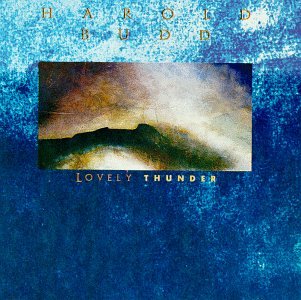 Harold Budd is one of those composer/performers who pops up periodically and wanders around like a medieval jongleur just doing his thing and collaborating with everyone. Noted for his piano improvisations, he has worked with the Cocteau Twins and Brian Eno, who seems to have given him a good swift kick in the ambient, reflected on the first part of Lovely Thunder.
Harold Budd is one of those composer/performers who pops up periodically and wanders around like a medieval jongleur just doing his thing and collaborating with everyone. Noted for his piano improvisations, he has worked with the Cocteau Twins and Brian Eno, who seems to have given him a good swift kick in the ambient, reflected on the first part of Lovely Thunder.
This album, however, starts off as ambient with dramatic tension. The first four tracks on this album, which seem to fit into two basic groups, are either quietly melodic, eerie little pieces (“Suntreader,” “Olancha Farewell”), or quiet, not so melodic, expectant little pieces (“Gunfighter,” “Ice Flows in Eden”). I have to take them as introduction and set-up for the last three tracks, which are rather more potent.
“Flowered Knife Shadows” is Budd at his most arresting. It is one of the more complex pieces on this collection, making use of Budd’s formiddable skills as an improvisationist to present a sinuous, wandering melodic line against a continuo that is not quite a drone. Budd’s piano work is mordant, sharp, at times almost jarring as he pits a ghostly, reverberant piano against a subtle and fluid synthesized background. Remarkable is the fact that, played as context, as I often do (throw a bunch of CDs on and get about your business), this one casts a huge shadow in memory – the visual image is somewhat akin to seeing Diamanda Galas in some of her more muscular performances – and yet, on close listening, there is a gentleness to this piece that is more than a little winning.
“Valse pour le Fin du Temps” begins with an ethereal, “space music” introduction that leads to a melody that hovers on the edge of cliché without ever quite crossing the line. To be honest, the body of the piece reminds me of some of the more revelatory scenes from Journey to the Center of the Earth, those in which James Mason worms through a crack in the wall to discover huge vistas of primordial landscape. It is actually quite a lovely melody, with an evocative quality that is quite surprizing.
“Gypsy Violin,” by far the longest piece on the album at somewhat over 20 minutes, takes a synthesis of every traditional “gypsy” melody we’ve ever heard and casts it into a very contemporary fantaisie in which the melody reappears sporadically, often reduced to a phrase, a leitmotiv that ties together a work seemingly without structure. (Needless to say, there is no real violin involved in this.) This one moves away from the expectancy of most the the music on this album – developed into full-blown foreboding in “Flowered Knife Shadows” – into an elegiac rumination that becomes almost symphonic in scope – there is an overarching sadness in this work that touches on profundity. Frankly, if this is what Budd is capable of, I wish he’d do more of it.
In spite of anything I may have implied above, I can’t take this as a collection of separate songs. It really makes the most sense as a single work in seven movements. On that basis, the emotional context builds consistently throughout, taking us from a kind of edgy expectancy in the beginning to a near-catharsis in “Gypsy Violin,” which is a truly affecting resolution.
With the full understanding that this is the kind of music that can drive some people crazy – it has a quality that I remember from Alien, in which tension builds up and up and you never really get to scream – I’d say sample Budd’s work before going after this one. As for me, I have no regrets.
(Editions Eg Records, 1990)
